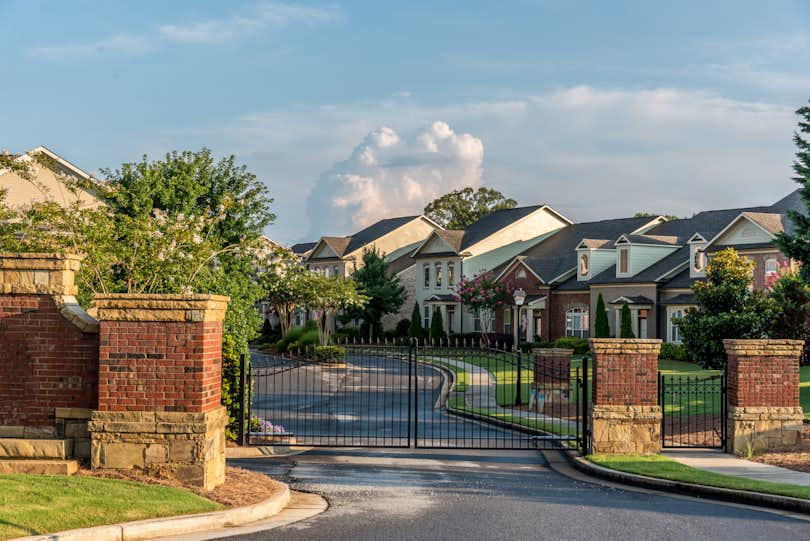Would require inspection and repair of community vehicular gates beginning July 1, 2026 and every 5 years thereafter.
Current Status: Dead
FindHOALaw Quick Summary:
Existing law authorizes an owner of real property to install and operate on their property an electrified security fence to protect and secure commercial, manufacturing, or industrial property, that meets specified requirements, except where a local ordinance prohibits that installation and operation. If a local ordinance allows the installation and operation of an electrified security fence, existing law requires the installation and operation of the electrified security fence to meet the requirements of that ordinance.
This bill would add Civil Code Sections 7111 and 7112 to require a regulated gate, defined as any gate that weighs more than 50 pounds and is more than 48 inches wide or more than 84 inches high that is located in an area that is open to the public, an entire community or neighborhood, or any considerable number of persons, except as specified, to meet certain standards.
The bill would add Civil Code Section 7113 to require the owner of a regulated gate to have it inspected on or before July 1, 2026, and have it re-inspected, thereafter, at least once every 5 years. The bill would require an owner to maintain a written report regarding the regulated gate’s compliance with the specified requirements for at least 5 years and make the report available to the building department upon request. The bill would require the owner of a regulated gate that a professional or qualified employee determines, upon inspection, to pose an immediate threat to safety to immediately stop the use of the gate until necessary repairs are completed and to engage a contractor or qualified employee to perform the repairs necessary to mitigate the emergency condition. The bill would require the owner of a regulated gate to engage a contractor or qualified employee to repair a regulated gate that is in need of repairs within 30 days of receipt of the inspection report, subject to imposition of an administrative fine by the building department. The bill would deem a regulated gate that fails to comply with these provisions 30 days after the owner of the gate has been notified of the violation, a public nuisance, and specify that in any case in which a government agency seeks to enjoin the continued use of a regulated gate that is in need of repair or replacement or that poses an immediate threat to the safety of the public, an entire community or neighborhood, or any considerable number of persons, the court may award costs, including the costs of investigation and discovery, and reasonable attorney’s fees, that are not compensated for pursuant to some other provision of law, to the prevailing party.
**AB-2149 was amended on June 24, 2024, to extend the inspection periods to every 10 years, and to allow a district or city attorney to file a complaint for injunctive relief or a civil penalty against an owner of a gate for a violation.
(b) On or before July 1, 2026, an owner of a regulated gate shall have the regulated gate inspected by a professional or qualified employee to ensure that the regulated gate complies with the requirements described in Section 7112 and obtain a written report from the professional or qualified employee that verifies compliance. The owner shall have that regulated gate reinspected at least once every five 10 years thereafter, in accordance with this part. Any repairs performed on a regulated gate shall ensure that the regulated gate continues to comply with the requirements described in Section 7112.
(h) A district attorney, county council, or city attorney may file a complaint in a court of competent jurisdiction for injunctive relief, or seeking a civil penalty, against an owner of a regulated gate for a violation of this part.
**AB-2149 was amended on July 3, 2024, to apply only to regulated gates installed on or after January 1, 2025 in schools and state parks.
(c) (1) This section shall apply to all regulated gates installed on or after January 1, 2025.
(2) For regulated gates in existence as of January 1, 2025, this section applies only to regulated gates that are located in either of the following:
(A) Private or public elementary, middle school, and high school grounds.
(B) Local or state parks.
View more info on SB 2149
from the California Legislature's website
Related Topics
Related Statutes
Related Case Law
- Sands v. Walnut Gardens Condominium Association Inc.
(2019) 35 Cal.App.5th 174
[Maintenance; Board Deference] No independent tort liability for failing to maintain common areas; Rule of Judicial Deference does not protect failure to perform inspections or preventative maintenance.
- Affan v. Portofino Cove Homeowners Association
(2010) 189 Cal.App.4th 930
[Maintenance; Board Deference] The deference afforded to HOA Boards may not extend to situations where the Board fails to act or to investigate the scope of required maintenance or repairs.
- Dover Village Association v. Jennison
(2010) 191 Cal.App.4th 123
[Maintenance; Board Deference] The deference afforded to HOA Boards for maintenance decisions does not extend to the Board’s interpretation as to the scope of the HOA’s maintenance responsibilities under its CC&Rs.
- Lamden v. La Jolla Shores Clubdominium Homeowners Association
(1999) 21 Cal.4th 249
[Rule of Judicial Deference; Maintenance] Courts will defer to decisions made by a HOA Board of Directors regarding ordinary maintenance of a common interest development.
Related Links


